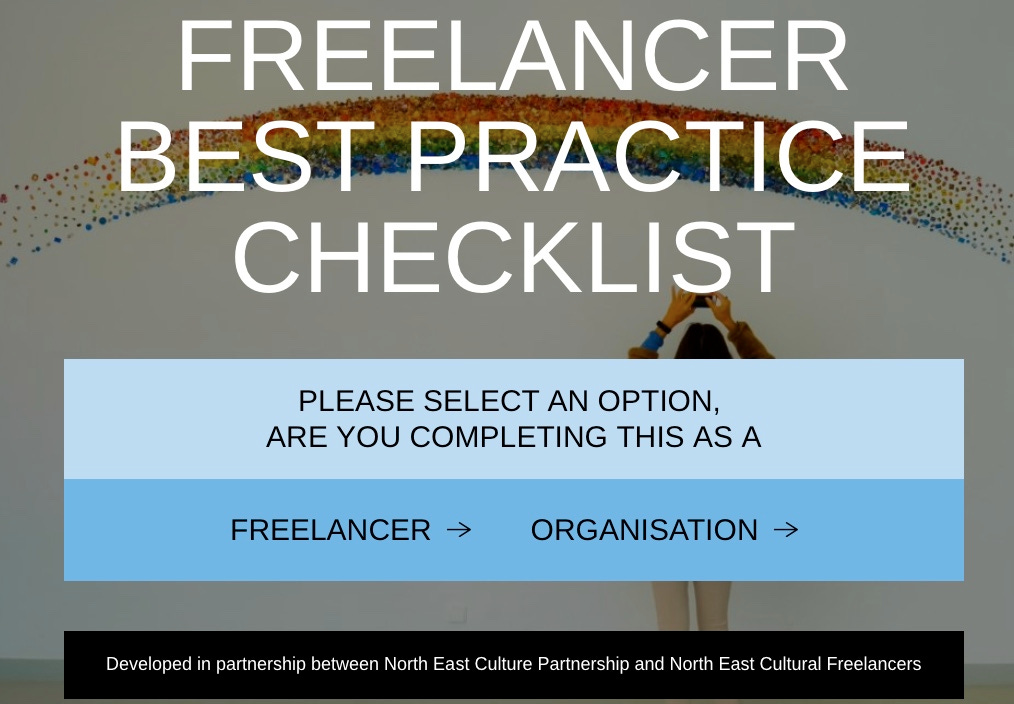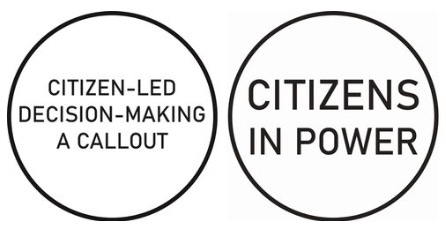North East Culture Partnership Freelancer Best Practice Checklist
The North East Culture Partnership brings together cultural leaders, universities and senior politicians from the seven most northerly local authorities in The Region Formerly Known as The North East. Last year it refreshed its Case for Culture, a vision for 2015-2030. This made new commitments, such as supporting NetZeroNE, growing the creative economy and equality, equity and audiences. In relation to developing the workforce and its skills, it aspired to make the North East the best place to be a cultural worker.
(I noted in writing this that the Tees Valley local authorities – historically and culturally part of the North East - no longer seem to have board members, a sad shrinkage for the partnership. This represents a probably inevitable alignment to the karmic devolution that will soon see a new combined authority and North East Mayor covering everywhere from Berwick to Bowes. However, the stats I refer to below take the North East with its wider footprint, including the five local authority area now collective dubbed Tees Valley.)
In pursuit of this aim NECP have recently launched a new Freelancer Best Practice Checklist, developed in partnership with the brilliant North East Cultural Freelancers. This is not one but two simple online surveys, one for freelancers and one for organisations working with freelancers. These help you know where you might need to do more to either protect your interests as a freelancer, or work healthily and equitably with freelancers. (You don’t have to live in North East England to use the Checklist, to state what may or may not be obvious.)
This is particularly helpful and important right now.
In Tactics for the Tightrope I talked about some of the chronic issues of freelance cultural workers such as lack of sick pay, late payments, affordability of training, and pensions, insurance and tax regimes. These could all be alleviated by employers as well as by the kind of self-organising that Leila D’Aronville has prompted since founding North East Cultural Freelancers. Sector specific networks such as Freelancers Make Theatre Work have also done great work. The issues facing artists and other freelancers have been described recently in various reports such as Structurally ****ed by industria for a-n, and the work of Susan Jones on new ways to create artists’ equity over a lifetime’s practice.
We also know that this is a lot of the creative and cultural workforce – up to 70% in theatre for instance. The walkers on the tightrope are often freelancers. Estimates across the sector vary but are generally around a third of the workforce is seen to be self-employed. The proportion dropped during covid, due to the impact of lockdowns especially in the performing arts, according to DCMS statistics. (From 32% in 2021 to 29% in 2022.)
The number of freelancers in the economy as a whole has increased each year since 2013, by 42% in that period. The solo self-employed workforce now contributes £278bn a year to the UK economy according to estimates for IPSE. However, this growth is not evenly spread, making practical support like the NECP Checklist especially important in some places and for people from some backgrounds.
In North East England there was a 9% drop in freelancers across the economy in 2021-22, the biggest drop bar Wales, whilst some places increased by 10% or more - London, Northern Ireland and Scotland. This will be at least mirrored in the cultural sector, which is one of the largest areas of self-employment and freelancing. So where you freelance makes a difference.
And where you start from makes a difference. 54% of ‘Arts, entertainment and recreation’ employees were 40 or younger in 20219 (ONS) but only 30% of freelancers fell into that age group. We also know that the creative industries workforce skews posher than the general population. 52% of the creative industries workforce were from high socio-economic backgrounds, compared to 38% across all industries in 2020 (PEC 2021).
The most common areas highlighted by the NECP checklist relate to contracting (good for all parties), being clear and keeping track of time, investing in freelancer skills development, and clear, simple communications. Organisations having a freelancer policy is also strongly suggested.
I can’t say I do or experience all these things 100% of the time – because I work based on relationships and trust so often, sometimes formally contracting doesn’t feel worth the effort, though I always establish as much clarity as possible about the work in hand, and set out clear proposals which are as clear as a contract.
Best practice won’t wipe away those inequalities in the time it takes us all to do one or both of these surveys. But it won’t hurt.
In my next post I’ll reflect on my own experiences of freelancing, and include some thoughts on what can make it more rather than less possible to sustain a freelance livelihood.
One more thing…
Citizens in Power is a relatively new organisation founded by Said Eddine Said and David Jubb to promote citizen-led governance. They have begun by creating a new approach to cultural strategy development in the West of England, working with Trinity Bristol and St Paul’s Carnival.
Now they are inviting people interested in leading a transition to citizen-led decision making in the cultural sector to sign up for a new national network. This network would share learning as people introduce citizen-led processes such as Citizens’ Assemblies or Juries over the next three years. It would involve workshops, support and peer learning. If that sounds up your street, get in touch with them via their website before 11 December 2023.
Tactics Tomato
Here’s a pomodoro playlist - with 40 seconds ‘slack’, which is, let’s say, a metaphor for the bit of a freelancer’s fee that should be going to holidays and pensions…
It starts with a song I knew first as relating to African-American history, but which I learnt recently was written as also a more direct complaint to a (white) ex-boss of the writer Randall Stewart: “When will we be paid for the work we’ve done?”





